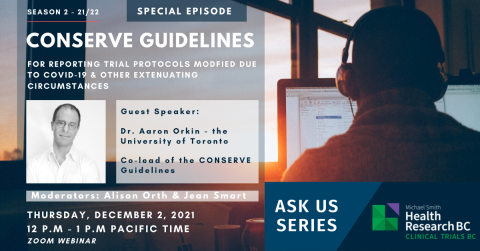ASK JEAN: Single-patient Studies & CONSERVE Guidelines
15 February 2022

Clinical Trials BC Chronicle Winter 2022 – by Jean Smart, Regulatory Affairs and Quality Officer, Clinical Trials BC
Question 1:
Are single-patient studies conducted in Canada?
Answer:
Yes. In the past two years, there have been over twenty single-patient studies (SPS) in Canada. Many of these are pediatric studies. The Health Canada’s criteria for an SPS is that the patient has a serious or life-threatening condition and is not eligible for or has exhausted all other treatment options. An SPS is certainly designed to allow for treatment under these circumstances, however it is still considered a clinical trial and must follow the regulatory requirements of Part C, Division 5 “Drugs for Clinical Trials Involving Human Subjects” of the Food and Drug Act Regulations.
The other avenue is applying to the Special Access Program. The advantages of doing an SPS are: firstly, regulated access to a product when other pathways are no longer an option, and secondly, the ability to collect data and formally document support of the advancement of knowledge on the investigational product in the disease area or condition. There remains a large gap in available guidance and certainly, resources for single-patient studies as an emerging topic and practice.
Question 2:
Does the new CONSERVE Guideline replace the CONSORT Guideline?
Answer:
No. it is a complimentary document.
Reporting guidelines are intended to improve both the transparency and completeness of research reports. The CONSORT (consolidated standards of Reporting Trials) Guideline was created in 2010 and it provides a recommended set of items to address when reporting completed trials. The reporting of clinical trials is a main feature in the recently approved International Council for Harmonization (ICH) E8(R1) document on ‘General Consideration for Clinical Studies’. There was limited guidance available for the reporting on clinical trials that had undergone trial modifications in unforeseen circumstances related to major disruptions.
‘CONSERVE provides guidance to support the rigor and transparency’ of reporting unanticipated circumstances and trial modifications’ (A. M. Orkin, JAMA 2021)
As a compliment to CONSORT, the CONSERVE guidance was created to provide a guidance to promote and improve upon the reporting practices of trials and trial protocols that are affected by important modifications in response to extenuating circumstance. The COVID-19 pandemic is considered an example.
The CONSERVE guideline has been made available on the SPIRIT and CONSORT website and on the Enhancing the Quality and Transparency of Health Research (EQUATOR) network (https://www.equator-network.org/).
If you are interested in reading the published article on the CONSERVE statement and Guidelines background and development click here: Guidelines for Reporting Trial Protocols and Completed Trials Modified Due to the COVID-19 Pandemic and Other Extenuating Circumstances: The CONSERVE 2021 Statement | Guidelines | JAMA | JAMA Network

Clinical Trials BC interviewed the lead author of CONSERVE, Dr. Aaron Orkin, in the December edition of the ASK US Series. To view the recording of this interesting episode:





